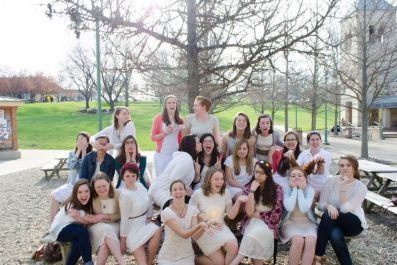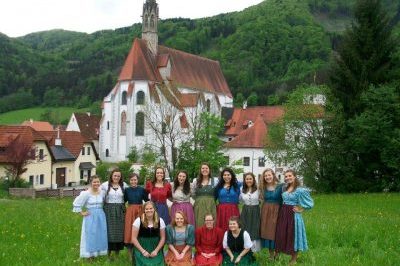Holy Week seems to be a fitting time to reflect on one of the biggest lessons I have learned in Austria thus far.
Trust.
The Miriam Webster dictionary defines trust as the “belief that someone or something is reliable, good, honest, effective, etc”. And this is of course true, but the richness of our Christian tradition enlightens our understanding of trust, making it more expansive. In faith, we understand that trust calls us to fully abandon ourselves to the Father, accepting that His will be done for us and rejoicing in the knowledge that His will is what is most perfectly suited for us. There’s a kind of relief in that reckless abandonment.
And I’ve felt that relief this semester. Over and over again, God is revealing to me, through my travels and encounters and experiences, that the trust He asks me to give Him is what is truly the most satisfying. But that trust, that release of control, is hard to give away.
To be honest, life here has been an absolute whirlwind since our pilgrimage to Poland a few weekends ago. I have been wonderfully blessed to continue to travel on adventure after adventure, but in the midst of seeing and doing so much, you can find yourself exhausted in a blink. The Franciscan Austria semester continues to give, it’s really too much to carry for one person; and so you have to turn your heart to God and allow Him to accompany you and take the weight.
Poland was especially heavy. But it was also here that I felt God asking for me to trust in His goodness in a deeper way than I have ever experienced before. Walking through the horror of the remnants of Auschwitz, I felt myself overcome. I couldn’t even bring myself to talk for most of the day; with each step it was like I was mourning for the memory of all those who had died there. Seeing the evil that existed in Auschwitz in such a real and horrid way was probably the worst thing I have ever experienced. How could such an experience be good? And what could trust have to do with this?
It was the words of one of my household sisters that day that helped me understand. She said, as we were walking back to the buses and leaving the camp, “God only left enough of Auschwitz for us to see how completely He has destroyed it.”
Evil can feel like a reason not to trust, like a hindrance in our ability to abandon ourselves to God. I felt that in Auschwitz. But the truth is that God continues to overcome evil again and again, reinforcing the power of the cross. In the face of evil, we are given an invitation to trust.
And so it is fitting that the next place our pilgrimage took us was to the Shrine of Divine Mercy, where Jesus gave St. Faustina the message of mercy that he meant for the whole world. The Shrine was so different than Auschwitz. It did not deny the existence of such evil, but it was not overcome by it. It proclaimed that the mercy of God was greater, and that it is only by trusting that we can receive it.
This is why Holy Week is the perfect time to recall the message of trust I received in Poland, and continue to learn in all of my travels. Trust is what Jesus showed during his own journey into Jerusalem and onto Calvary for our sake. He trusted in the goodness of the Father, abandoning himself to His will even when he felt the worst of pain in his humanity. We learn from him that is an abandonment well worth giving because, though it leads us like Christ towards the cross, it comes with the relieving promise of the Resurrection.
I’m finishing up this blog post as I ride on a train from Austria to Paris, and then from there on to Lourdes. I’ll be spending my ten-day break serving with the rest of the Lourdes mission team washing the sick who come to visit the baths there. I’m excited and nervous, and I’m not sure what to expect, but I trust. And I have hope that through that trust will flow mercy.





